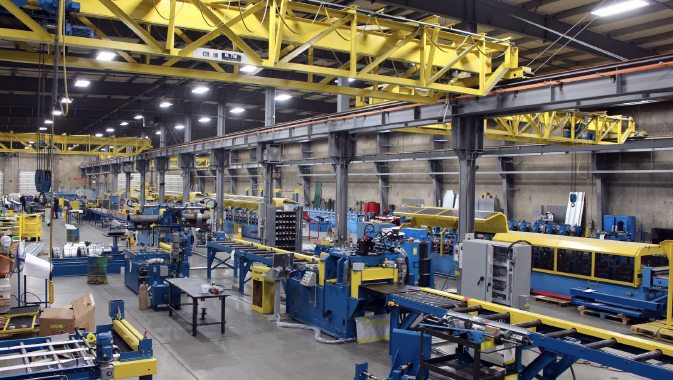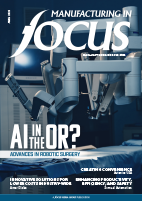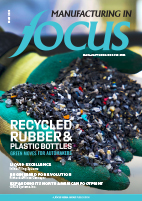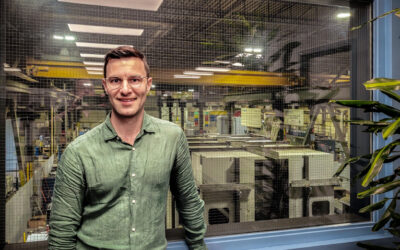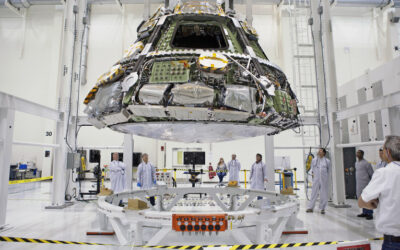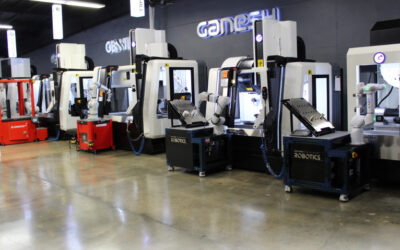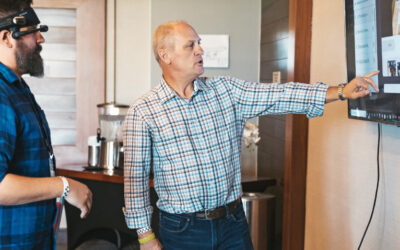ASC Machine Tools of Spokane Valley, Washington, is a vertically-integrated machinery design and manufacturing company with a diverse product range that designs and builds equipment that is used to manufacture products you use every day. I spoke with Thomas Schwarzer, its marketing manager.
~
“The company will turn seventy next year, but we won’t have much time to celebrate. We’re very busy with current orders, have several ongoing R&D projects and are working on installations around the world for custom equipment for customers in different industries. ASC will also be attending two major tradeshows METALCON and FABTECH at the end of the year,” says Thomas.
ASC was founded in 1949 and has long been a closely held, family business. In 2013, Ray McGriff Jr. took over the company from his father, Ray McGriff Sr., and his partner, Don Cornell, who successfully owned and operated ASC for over three decades. As owner and Chief Executive Officer, Ray Jr. hopes to build on the success of his predecessors and continue their fine work.
The focus from the beginning was on manufacturing equipment. ASC serves a wide range of industries, with a primary focus on the steel construction and two-piece food and beverage can industries. It makes a wide range of custom roll forming equipment and coil handling equipment, supplying high-quality, rugged machines to a worldwide customer base.
ASC is a vertically integrated manufacturer, performing all design and manufacturing processes in-house. Equipment is designed utilizing a high-level solid modeling CAD design program and produced with modern CAM manufacturing, including tooling and die sets. ASC also has full in-house controls and automation capabilities, with full industrial control design/build capability. It has established long-term partnerships with key part and raw material suppliers.
“We are a U.S. company, with a 175,000 square-foot headquarters and production facility in Spokane and are committed to building products here in the U.S.A. Unlike a lot of our competitors, we don’t outsource tooling and controls, or utilize offshore suppliers or subsidiaries. This approach gives us better control over all aspects of the manufacturing process,” says Thomas.
Many industries are supplied with roll forming equipment and lines – both standard and customized – by ASC. Roll forming takes a continuous strip of sheet metal and uses a series of rollers to form it into the desired shape.
Roll forming can make parts that normally would be made on a press brake and create them more quickly, cutting production times. “If you have a certain shape that would normally be produced on a press brake – that takes a lot of manufacturing time and personnel. A roll forming machine cuts 80 to 90 percent of the time to manufacture the same part. Roll forming speeds up what was normally manual work, especially in custom manufacturing,” says Thomas.
ASC can supply industries with customized machinery because of its in-house tooling design and the vast experience that its people have. “Experience is a very important factor in our business. Our technical proficiency with in-house tooling design and the capability to build a complete manufacturing line in-house is the real key to success,” says Thomas.
The company offers many options for lightweight panel lines that can run up at production speeds up to 450 feet (140 meters) per minute. On the other end of the spectrum, ASC has supplied heavy duty rollforming lines capable of forming steel up to 3/8” (10mm) material thickness. A proven record of success with a wide range of industrial and commercial products is where ASC surpasses its less-experienced competition.
It is not uncommon to perform changes on a custom piece of equipment while it is being built. There is also much design work that goes on while the machine is being tested and built. “To patent this technology is difficult as it takes a long time to accomplish. We have a new CZ purlin stacking system with a patent pending for the last eighteen plus months, and it costs a lot of money to do that. We are not a big corporation that can patent every new product we develop every year, so we focus on the most unique and commercially relevant items,” says Thomas.
Thomas recognizes, in talking to customers, that finding skilled labor is a constant challenge nationwide. “There are not a lot of people out there who can or want to operate industrial machinery. We’re graduating a lot of engineers, but not many want to work in a metal shop.”
There are companies like Boeing and others in the region that at first seem appealing to potential employees. There is certainly more money out there, but housing is expensive and maintaining the standard of living is very costly. At some point, a lot of them end up coming back to Spokane – it’s a different work environment and a great place to live.
“Not many people become machinists these days. It’s a rare breed. We have a lot of skilled labor and people that have worked here for thirty plus years, but new machinists are hard to find. ASC has partnered with local trade schools and is a member of the Workforce Developmental Council at the local Community College. We also recognize, train and develop talent in-house,” says Thomas.
If you become a machinist, you have a job waiting when you graduate. With machinists in such high demand, companies like ASC are scouting before students finish their programs. “We try to keep in touch and recruit students before they graduate, but that is challenging with a booming U.S. economy,” says Thomas.
ASC is growing steadily, but everybody in the machine building industry took a hit in 2002 as well as with the recession of 2008. New people have been hired, with more to come. The company employs around 200 at present and is doing very well with many orders to fulfill. It is currently hiring to expand production, and is always looking for quality people to join the ASC team.
One of the advantages for ASC is the diversity of products it offers that target different industries. If one industry is in a down cycle, production typically shifts to other industries because historically they are not all down at once. With a diverse customer base, ASC strives to be as recession-proof as possible.
There were some slow times in the metal construction industry, in which very few investments were made. Now, capital investment is back, and ASC sells a lot of equipment to companies that make agricultural storage, accounting for a significant percentage of annual sales volume.
Most of ASC’s component and raw material suppliers are from the U.S. Allen-Bradley and Haskins Steel are just two of the large network of qualified vendors that ASC uses. It has had long-term relationships with all its suppliers – in some cases, thirty-five to forty years.
“We don’t build low-quality equipment. It is all built with quality components to the highest possible standards, whether it’s an entry-level or high-production line. We try to source mainly from the U.S. market. Our goal is to use U.S. components for the quality and warranty. This helps us and our customers a lot,” says Thomas.
Looking to the future, ASC will continue to expand worldwide, with Sales Offices in the UK and Brazil, and has added International Sales personnel. ASC is attending more international trade shows, and international sales are reaching new heights. It currently ships about forty to fifty percent of its annual volume of sales to overseas customers.
“We’ve recently attended trade shows in Mexico, the U.K., Egypt, and Saudi Arabia, all giving us more exposure. We have a lot of orders and are working with a considerable backlog. When business is good, you’re more comfortable spending money to make yourself known,” says Thomas.
ASC is continuously working on developing products. It recently introduced the highly-successful Alpha SeriesTM panel lines and will be coming out with several other new products in 2019 as well.
“We are committed to manufacturing in Spokane. We will continue to grow our company and customer base, and we anticipate that the positive trend in the industry will continue for years to come. We grow to satisfy the demands our customers and are happy to be a mid-sized company,” says Thomas.

